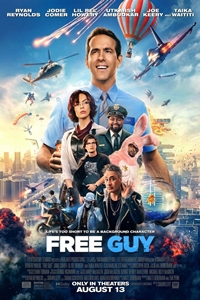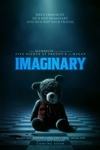Free Guy (PG-13) ★★½
 As a comedic satire of gaming and an offbeat romantic comedy, Free Guy is amiable and entertaining, if a little too long (an unfortunately common problem among big-budget movies in the 2010s and 2020s). When it comes to the film's "deeper" elements, especially in the way it addresses AI and the potential of a computer achieving sentience, the approach is significantly more artificial than intelligent. By cobbling together elements of The Truman Show, Ready Player One, Groundhog Day, and (especially) The Lego Movie, Free Guy employs a premise that's in danger of becoming overused but has enough fun with the concept that the viewer can't help but enjoy the ride (a least for a while).
As a comedic satire of gaming and an offbeat romantic comedy, Free Guy is amiable and entertaining, if a little too long (an unfortunately common problem among big-budget movies in the 2010s and 2020s). When it comes to the film's "deeper" elements, especially in the way it addresses AI and the potential of a computer achieving sentience, the approach is significantly more artificial than intelligent. By cobbling together elements of The Truman Show, Ready Player One, Groundhog Day, and (especially) The Lego Movie, Free Guy employs a premise that's in danger of becoming overused but has enough fun with the concept that the viewer can't help but enjoy the ride (a least for a while).
Free Guy transpires in two realities. The first is in a facsimile of our world, where we meet game architects Millie (Jodie Comer) and Keys (Joe Keery). Their signature AI was stolen by Soonami Games mogul Antoine (Taika Waititi), who buried it deep within the code of the mega-popular "Free City" game he released. Keys is now on his payroll while Millie is filing a lawsuit. Meanwhile, inside the game, NPCs Guy (Ryan Reynolds) and Buddy (Lil Rey Howery) go about their daily business. They both work at a bank in Free City (Guy as a teller and Buddy as a security guard), where their days are all the same. Things change for Guy, however, when he glimpses Molotov Girl, Millie's in-game persona, and decides that she's "the one." In order to impress her, he begins to break free of his programming -- something that excites Keys when he realizes that their AI has taken the next step in evolution. Millie isn't thrilled when she realizes she has kissed a bunch of 1's and 0's.
Director Shawn Levy (whose uninspiring big-screen resume includes the likes of the Pink Panther remake and Night at the Museum) maintains a breezy tone for the better part of the first 2/3 and his action scenes are intentionally over-the-top CGI orgies that enjoy poking fun at superhero movies. Some of his gags are low-hanging fruit and rely a little too heavily on the nerd/gamer stereotype of the socially awkward loser who lives in his mom's house. The bevvy of cameos includes YouTube luminaries, vocal work from a variety of A-listers, and one marvelous surprise. Free Guy also features an appearance by the late Alex Trebek.
The film loses both its light-hearted momentum and narrative coherence late in the proceedings. An opportunity for a Deep Blue Sea moment is ignored in favor of playing it straight with one of those big, heroic speeches. The real-world scenes are dumb and dumber, putting the onus on the Free World action to keep the movie afloat -- something it only partially achieves. The battle between Guy and Dude is fun but goes on for too long and the Big Climax makes no sense whatsoever.
Ryan Reynolds has become so stereotyped as the wisecracking, pratfalling straight man that it's no longer possible to take him seriously. Free Guy might have worked better if it had admitted this and focused more on Reynolds' strengths rather than giving him rousing speeches and a rom-com thread. His co-star, Jodie Comer, has a strong TV resume but not a lot of motion picture exposure (she was Rey's mother in The Rise of Skywalker), but is comfortable in both her low-key, real-world role and her action-oriented Free World avatar. Taika Waititi goes so far overboard in a delicious display of scenery-chewing that he makes his previous appearance as Hitler seem restrained.
Although parts of Free Guy are effective in an undemanding way, and there some nice laughs to be had along the way, the screenplay dumbs down the AI aspects to such a degree that the movie not only seems insulting at times but can't figure out how to wrap things up. Reynold's charisma and some solid gags hold things together for a while but the movie ultimately comes up short despite its promising premise. Its obvious inspirations were all better but, in the growing subgenre of movies-inside-computer games, at least it's an improvement over Space Jam: A New Legacy.
© 2021 James Berardinelli
To get the full Quicklook Films experience, uncheck "Enable on this Site" from Adblock Plus
box office top 10

Godzilla x Kong: The New Empire Released: March 29, 2024 Cast: Rebecca Hall, Brian Tyree Henry 80M

Ghostbusters: Frozen Empire Released: March 22, 2024 Cast: Paul Rudd, Carrie Coon 15.7M

Dune: Part Two Released: March 1, 2024 Cast: Timothée Chalamet, Rebecca Ferguson 11.1M

Kung Fu Panda 4 Released: March 8, 2024 Cast: Jack Black, Viola Davis 10.2M

Immaculate Released: March 22, 2024 Cast: Sydney Sweeney, Álvaro Morte 3.3M

Tillu Square (Hindi) Released: March 29, 2024 Cast: Sidhu Jonnalagadda, Anupama Parameswaran 2.5M

Arthur the King Released: March 15, 2024 Cast: Mark Wahlberg, Simu Liu 2.4M

Late Night with the Devil Released: March 22, 2024 Cast: David Dastmalchian, Laura Gordon 2.2M

Crew (Hindi) Released: March 29, 2024 Cast: Kriti Sanon, Kareena Kapoor 1.7M

Imaginary Released: March 8, 2024 Cast: DeWanda Wise, Tom Payne (II) 1.4M






